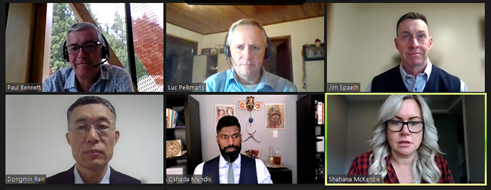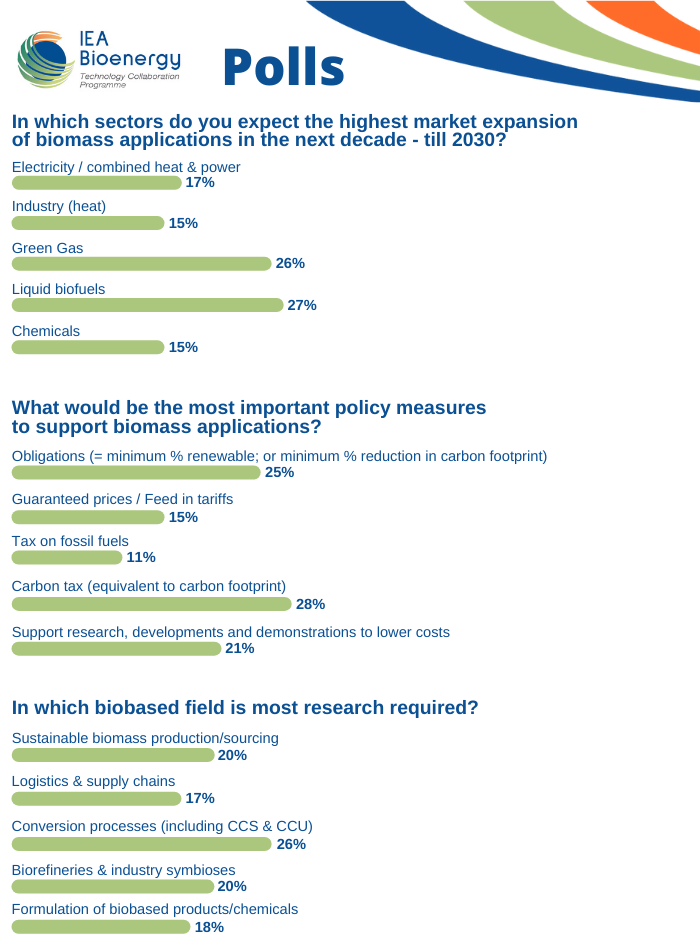This closing session summarized some of the key findings from the technical sessions.
Panelists from different countries (see regional focus) provided input on what they see as main development opportunities on biomass in their country, what are the main challenges and what is needed to accelerate developments and deployment.
Panel Debate
Moderator![]() Paul Bennett, Portfolio Leader – Integrated Bioenergy, SCION, New Zealand
Paul Bennett, Portfolio Leader – Integrated Bioenergy, SCION, New Zealand
Introductory presentation: Key conclusions from the technical sessions of the conference![]() Luc Pelkmans, Technical Coordinator, IEA Bioenergy TCP, Belgium
Luc Pelkmans, Technical Coordinator, IEA Bioenergy TCP, Belgium
Panelists![]() Dongmin Ren, Director, ERI Renewable Energy Center, China
Dongmin Ren, Director, ERI Renewable Energy Center, China![]() Shahana McKenzie, CEO, Bioenergy Australia, Australia
Shahana McKenzie, CEO, Bioenergy Australia, Australia![]() Oshada Mendis, Deputy Director, Clean Fuels Portfolio, Natural Resources Canada, Canada
Oshada Mendis, Deputy Director, Clean Fuels Portfolio, Natural Resources Canada, Canada![]() Jim Spaeth, Program Manager, Systems Development and Integration, Bioenergy Technologies Office, U.S. Department of Energy (DOE), United States
Jim Spaeth, Program Manager, Systems Development and Integration, Bioenergy Technologies Office, U.S. Department of Energy (DOE), United States
.
Highlights
- The establishment of carbon neutrality goals in China provides a new basis and impetus for the development of biomass energy industry. Giving full play to its advantages, realizing diversified development, and paying attention to rural energy will be a new choice for China’s biomass energy industry in the future.
- New Zealand is somewhat behind other countries in terms of bioenergy deployment, but things are changing and moving quickly with several government initiatives to accelerate the implementation of bioenergy and industries now also taking concrete steps. Carbon pricing is a key instrument.
- The Government of Australia released a National Bioenergy Roadmap in November 2021 which forms the basis for future bioenergy deployment. The focus will be on hard-to-abate sectors, such as industrial heat, aviation, and renewable gas. Opportunities of bioenergy/biofuels to complement other low emission alternatives in road transport and electricity markets will also be enabled.
- Canada has important biomass supply opportunities. Acceleration of bioenergy development is needed to meet Canada’s climate goals. Overcoming its challenges requires a combination of market-pull policies (clean fuel regulations, carbon pollution pricing) and technology-push funding (fiscal incentives and investment support).
- The United States Department of Energy wants to accelerate RDD&D (Research, Development, Demonstration & Deployment) of innovative technologies to transition America to a 100% clean energy economy no later than 2050. Bioenergy can support decarbonization in multiple sectors of the economy, particularly in transport, industry, and agriculture. Sustainable Aviation Fuels are currently the number one priority in DOE’s programme on bioenergy.
General conclusions:
- Different decarbonisation options should work in synergy and complement each other as the challenge to reach net zero is huge. Placing different options against each other is unhelpful.
- There is general agreement (also in roadmaps) that bioenergy is critical, but acceleration is needed.
- Sustainable feedstock mobilisation is key for the bioeconomy and provides many opportunities, particularly in rural areas. There are many misunderstandings on biomass potentials and its sustainability. Direct dialogues are needed based on facts.
- Bioenergy is a broad term. It is best to focus on markets and the solutions that are provided: cleaner fuels, sustainable aviation fuels, renewable gas, …
- The most important policy measures to support biomass applications are (1) carbon pricing; (2) obligations in specific markets; and (3) support RD&D to lower costs.

Recording


